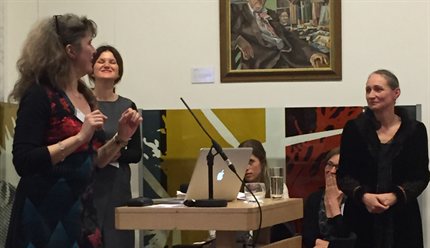Prof Houart receives MRC Suffrage Science honour
Corinne Houart, Professor of Developmental Neurobiology and Deputy Director of the Department of Developmental Neurobiology at King’s College London, has been recognised along with nine other leading female researchers and a science communicator at the annual Medical Research Council event, Suffrage Science.
The ceremony took place on Tuesday – on International Women’s Day – at the Royal Society in London.
Suffrage Science celebrates the achievements of leading female researchers in physical sciences and engineering with medical applications, while recalling the women’s suffrage movement. Awardees are chosen for their scientific achievements and ability to inspire others by current award holders.
The scheme celebrates women already in science and encourages others to enter scientific subjects, and to stay. Dr Helen Pankhurst, great granddaughter of Suffragette Emmeline Pankhurst and long-standing supporter of the scheme, joined a panel discussion on how to make a difference for women today. Science writer and broadcaster Dr Kat Arney led a discussion on how to make science inclusive for all, and with help from current award holders, Dr Jennifer Rohn and Professor Irene Tracey, explored the concrete changes needed to make this vision a reality.
Professor Houart’s research explores how the front of brain, or forebrain, is ‘built’ during development and before birth. She aims to understand the role that particular molecules play in sending information, or signals, across the developing brain. Professor Houart also studies proteins that may be involved in the degeneration of nerve cells that control our movements.
She said: 'It is a real pleasure to receive this award as it not only recognises women's achievements as scientific leaders but also celebrates the great value of human connections and collaborative spirit. The award is passed on from one female leader to another and it is a real honour for me to have received it from Kate Storey, whose scientific and leadership achievements I sincerely admire. Marysia Placzek and Liz Robertson are previous recipients of our "lineage", a really wonderful set of women to be connected to.'

The Suffrage Science scheme was set up six years ago by the Clinical Sciences Centre (CSC), a leading research institute of the Medical Research Council, based at Imperial College. It has been nurtured by institute director Professor Amanda Fisher, and now includes both a life sciences cohort and a physical sciences cohort, with plans to expand further.
This scientific ‘relay' creates an ever-expanding cohort of talented women with a connection, to encourage others to enter science and reach senior leadership roles.
The awards themselves are heirloom items of jewellery, similar to those worn by the Suffragettes. The jewellery was created by students of the art and design college Central St Martins-UAL, who worked with scientists to design pieces inspired by research. The students also drew inspiration from the Suffragette movement from which the award scheme takes its name.
Dr Helen Pankhurst said: 'Women scientists can put their mark on the world in a new way that affects change in a more gendered way. If we only have scientists who are men it's a particular eye on the world that gets changed. If we have women scientists involved, then their engagement in that relationship between science and humanity is to the benefit of us all.'
According to Dr Pankhurst, the scheme can play a strong role in keeping a flashlight on issues such as gender and activism in science: 'If we make a noise and make it visible, we can hope for change that way.'